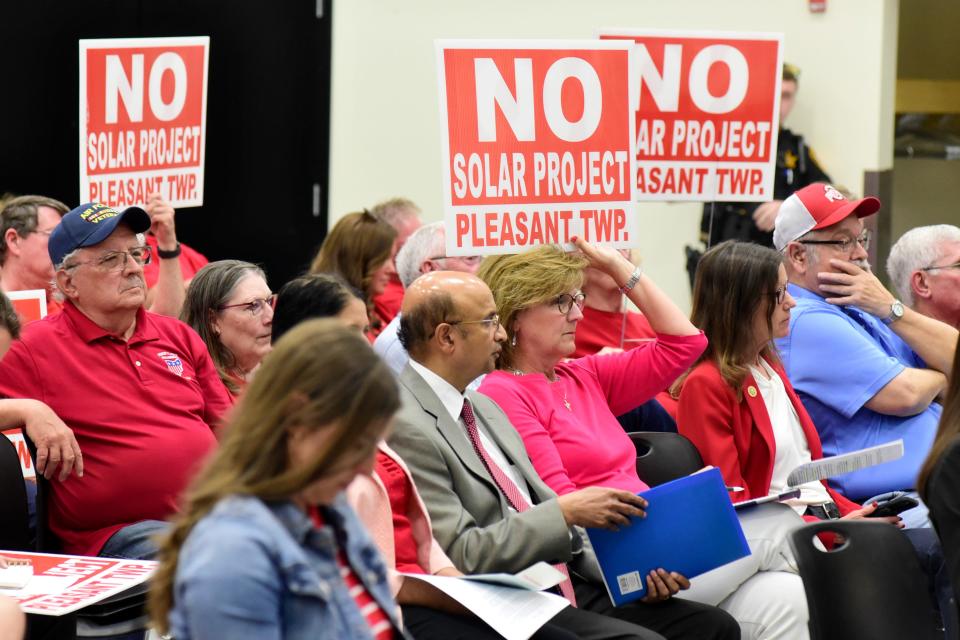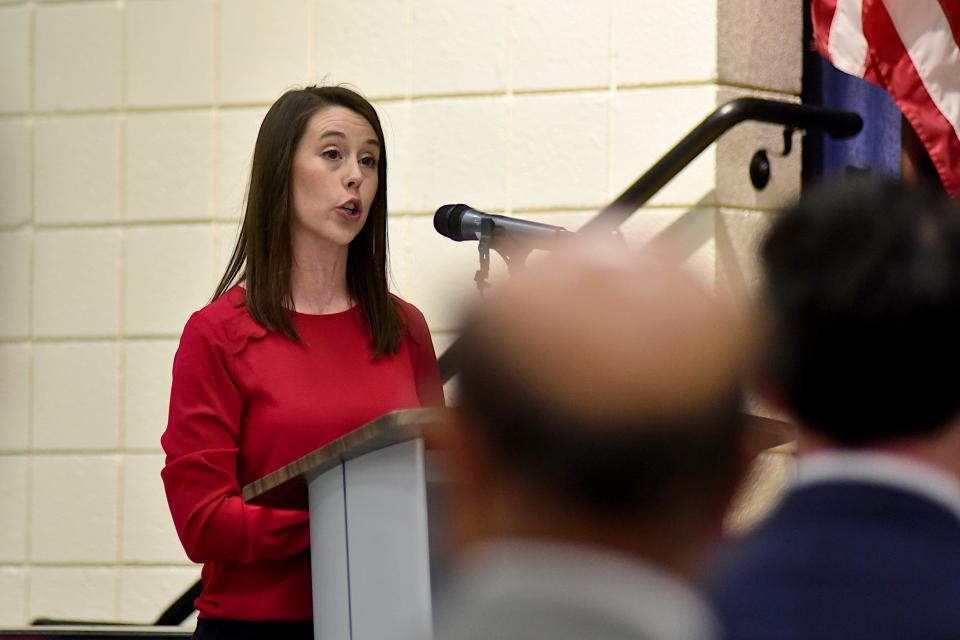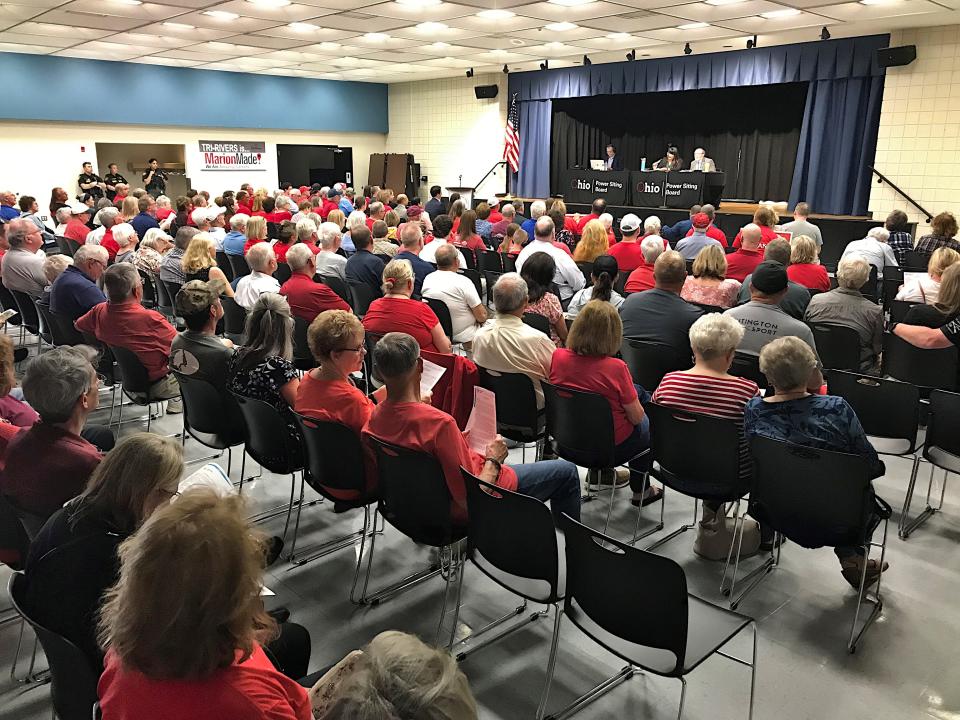Residents say they fear chemical leaks, water contamination, flooding if solar farm OK'd
The first of two hearings to decide the fate of a proposed commercial solar farm in Marion County attracted more than 150 locals Monday evening.
County residents took turns telling administrative law judges from the Ohio Power Siting Board why they opposed the potential Chestnut Solar project in Pleasant Township.
Their comments were focused on health, financial and environmental concerns with the construction, installation and maintenance of the solar arrays.
Power Siting staff recorded resident testimonies and collected documents presented during the hearing.
Board judges are expected to combine evidence from Monday's hearing with more from an adjudicatory hearing later this spring, then rule on the proposal sometime this summer.

'We can go on and on about the reasons'
The project was born in 2016 when the National Renewable Energy Corp., which is based in Charlotte, North Carolina, began concept work for a proposed Chestnut Solar LLC solar farm in Marion County.
The solar facility, if completed, would take up 404 acres in eastern Pleasant Township and have the capacity to produce up to 68 megawatts of electricity for as long as 45 years.
According to a map of the site, the facility's borders would be Somerlot Hoffman Road to the north, Newmans Cardington Road to the south, Maple Grove Road to the west and U.S. Route 23 to the east.
Nissa Stump lives in that area and became so worried about the solar panels that in 2020 she helped form the Facebook group Concerned Citizens of Pleasant Township, which has grown to more than 500 members.
She outlined her group's history Monday evening, then told members of the Power Siting Board that most Marion residents feel they've already made it clear they don't want a solar farm in the county.
"Unfortunately, this still wasn't enough," Stump said. "We can go on and on about the reasons that we're against this project."
Her list included health implications, reduced property values, loss of fertile farmland, flooding, negative effects on drinking water, detriment to wildlife, increased noise, public safety and possible strain on emergency services.
"This project would directly affect the health, safety and security of our community," Stump said. "The long-term consequences of commercial solar panel facilities is truthfully unknown, and no one wants another Marion County environmental disaster on their hands."

'This would be an eyesore'
Residents were allowed five minutes to address the board with their concerns. Most of their comments echoed Stump's.
Phyllis Minks has spent the last 20 years in the area in what she called her "dream home." She said her neighborhood is filled with "million-dollar homes," all of which she fears would lose value if the solar project is built.
"This would be an eyesore," Minks said. "Not a welcoming sight."
Even more worrisome for her was the fear the solar panels might leak chemicals, which could be carried by the rain onto the surrounding farmland and even into the Marion County water table.
She's afraid toxins from the solar farm could taint the entire county's water supply.

'This is a residential community'
Harold Cooper has lived in the neighborhood his whole life.
"This is a residential community," he said.
The number of solar panels proposed for the area was alarming to him.
He said he was even more alarmed when he learned most of the panels were assembled in China, and that nearly all of their components were produced in China.
"I don't know what you know about China," Cooper said. "But they're out to take the United States down."
He said he didn't think solar panels were practical anywhere Ohio, considering how little sun the state gets half the year.
"Rain won't clean the solar panels," Cooper said. "When they get covered with dust and bird poop, somebody has to go clean them."
'Living in a Stephen King nightmare'
Paul Cotton said he and his wife moved to Pleasant Township in 2003. Ever since, they've enjoyed "a quiet country life."
"We now find ourselves in the early chapters of living in a Stephen King nightmare," Cotton said.
He said he was concerned with the amount of noise that solar array produce while they invert the electricity from direct current to alternating current.
He also fears the solar arrays will increase the rate of flooding in his neighborhood, which he believes will create toxic pools filled with sewage.
Georgia "Dee" Cackler agreed with him. She said she's lived on Maple Grove Road the past 44 years, and there seems to always be standing water in the neighborhood.
"This isn't just a spring and summer problem," Cackler said. "We have standing water in January. This happens year after year."
Chestnut Solar has filed a motion to suspend the next hearing
On April 26, the final business day before Monday's public hearing, Chestnut Solar filed a motion to stay — or, suspend — the adjudicatory hearing, which had been scheduled for May 20.
As of Tuesday evening, that adjudicatory hearing had not yet been rescheduled.
Ben Friedell, chief commercial officer of Clean Shift Energy, which spun off National Renewable Energy Corp. last year, said after the hearing that all of the technical concerns raised by residents were addressed in the project's application.
"The (power siting board), who is empowered by the state to implement the nexus of state agency regulations, as well as the laws of Ohio that govern project's such as Chestnut, has clearly heard the health, safety, and environmental concerns of communities like Marion County in the past and has enhanced regulations to address those concerns," Friedell said. "As a result, the process is straightforward and should remove ambiguity from a complex yet vital siting process supporting necessary energy infrastructure projects to support the State of Ohio and Marion County for years to come."
ztuggle@gannett.com
419-564-3508
This article originally appeared on Marion Star: Chestnut Solar proposal draws negative responses at Marion hearing

